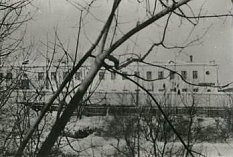In Issue 8 of the Chronicle (CCE 8.7) some information was given about the Special Psychiatric Hospitals.
These are hospitals with a prison regime, where, together with people who have committed terrible crimes when not answerable for their actions, dissenters who have been declared mentally ill are frequently sent.
In this issue the Chronicle gives some detailed information about the Special Psychiatric Hospital in Kazan, Tatarstan.
Kazan Special Psychiatric Hospital
The hospital has eleven sections; two of them house working patients. In the third the patients sew aprons, sheets and other articles, and in the fourth they are responsible for keeping the hospital in good repair. The working day is three and a half hours long; the monthly wage is two roubles, irrespective of productivity.
Section 11 is designed for tubercular patients, but frequently healthy people are put into the cells with them, especially new arrivals. Patients are transported to the hospital in the usual way, in Stolypin rail-waggons [Commentary 10] and voronki (“black Marias”).
*
Treatment by Sulfazin injections is widely used in the hospital.
This reduces the patient to a very serious condition: a temperature of 40 degrees Centigrade [104 Fahrenheit], weakness, rheumatism of the joints, headaches, and pains in the buttocks, where the injections are given.
In normal psychiatric practice, as is well known, such injections are used as an extreme measure when violent fits occur. A less dangerous method of treatment is by intramuscular injections of Aminazin (Chlorpromazine), but this is carried out in such a way that the injected Aminazin is not absorbed, but forms malignant tumours which have to be removed later by operation [note 1].
If the patient commits offences — refuses to take medicine, quarrels with the doctors, gets into a fight — he or she is strapped into the bed for three days, sometimes more. With this form of punishment, elementary sanitary rules are ignored: the patient is not allowed to go to the lavatory, and bedpans are not provided.
*
The hospital library overflows with hack-writing from the Stalin period, but months pass without even these books being issued.
People sent to this hospital are those whose dissenting views are qualified as a ‘crime’ or a ‘disease’.
One case is known when a man taken there was really ill, and had committed no crime. His first name is ‘Vladimir’ (the Chronicle does not know his surname), and he had an epileptic fit on the street. The police picked him up and took him to a sobering-up station. When he protested that he was not drunk but ill, they beat him savagely. His wife, who had written proof of the beating, wished to institute criminal proceedings against the policemen. However, the doctor treating her husband, and his lawyer, persuaded him and his wife “not to get involved in anything.” For 18 months, Vladimir was held in an ordinary psychiatric hospital; then he was sent to Kazan.
*
The Chronicle reminds its readers that in accordance with the RSFSR Criminal Code (Articles 58-60) internment in a Special Psychiatric Hospital, like any other forcible treatment, can only be prescribed by a court [note 2].
The address of the hospital is: Kazan, UE 148/, building 6.
=======================
NOTES
[1] The use of drugs “for treatment (and as a punishment)” is described in Sidney Bloch & Peter Reddaway, Russia’s Political Hospitals (1977).
[2] The two routes in the USSR, civil and criminal, to commitment to a psychiatric hospital have been outlined, and illustrated with case studies, in Bloch & Reddaway (1977): see chapters 5 & 6.
